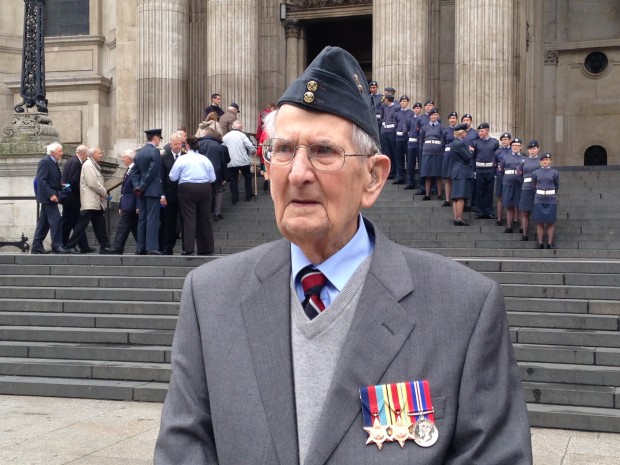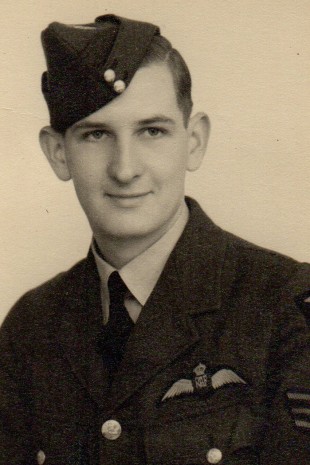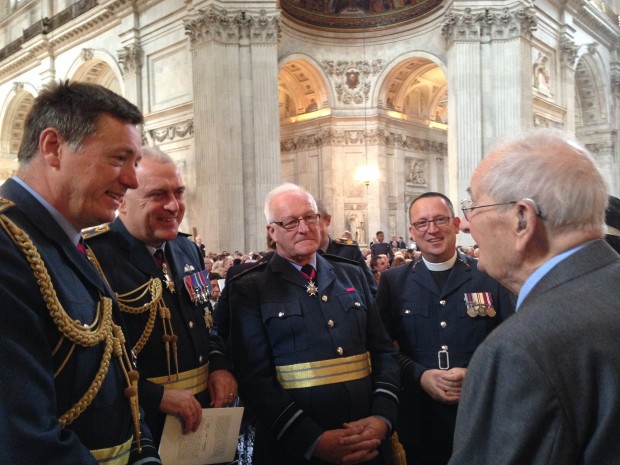RAF veteran William Clark finally received his World War II medals today, 15 September, on his 95th birthday - and on the 75th anniversary of the Battle of Britain.
Chief of the Air Staff, Air Chief Marshal Sir Andrew Pulford, presented the former fighter pilot and prisoner of war Mr Clark with the Africa Star, 1939-45 Star and the War Medal on the steps of St Paul’s Cathedral.
Mr Clark, who is originally from Kent but now lives in Nottingham, only applied for his medals this year so that he could wear them to unveil a memorial to World War II aircrew at RAF Debden this weekend.
He said:
"I am delighted to be awarded my medals by the most senior officer in the RAF officer, rather than being presented them by the postman in a little cardboard box. It was very exciting and a proud moment."

He enlisted with the RAF in April 1940, aged 19, and was under training during the height of the Battle of Britain. Mr Clark welcomed the opportunity to pay tribute to the RAF veterans who took part in the battle, describing himself as ‘just one of the many, who followed “the Few”.
The former fighter pilot learnt to fly Battles, Ansons and then Hurricanes before he was posted to Malta and then to 274 Squadron Amriya in Egypt on 13 July 1941, where his unit flew Hurricanes and Gladiators on fighter sweeps against the Nazis over the African desert.
But just after his 21st birthday, Mr Clark’s aircraft was shot down and he was taken prisoner by the Germans.
He saw “little balls of fire” approaching him, fired by the anti-aircraft guns on the ground, and can distinctly remember the shock of the crash-landing after his plane was hit. Surviving the crash he then trudged in the desert’s midday sun wearing fur-lined flying boots, in heavy desert battle dress as he tried to evade the enemy.
Mr Clark said:
“It wasn’t a very pleasant experience and of course there was the shock. I was only just 21 and suddenly I was not in my normal environment – in the sky, in an aircraft.
“Here I was wandering about all on my own in a vast expanse of rock and sand. It was very, very lonely. I’ve never been so lonely in my life.”

Mr Clark was captured and made a POW and spent the rest of the war being moved between prisoner of war camps in Italy, Austria and Germany, during which time he was promoted from Sergeant Warrant Officer.
He recalled the boosting food parcels, concert parties and escape plans as well as the hunger, boredom, lice and fleas.
“Morale in the camps used to go sky high whenever the Red Cross food parcels were available. When they weren’t, things were pretty grim because the food was very, very meagre,” he said.
Mr Clark arrived home in the UK on 8 May 1945 – VE Day. His first glimpse of home was from the cockpit of a Dakota, when he saw bonfires being lit beyond the white cliffs of Dover.
He demobbed later that year, and went on to become a head teacher, marry and have two children.
Mr Clark did not apply for his World War II medals until recently: “I thought ‘When am I going to wear them?’ So I never bothered asking for them. Then I was asked to unveil a memorial this week and was told I needed to wear my medals in memory of all those people I flew with who would never fly again.”
Minister in the House of Lords, Earl Howe, said:
“It is a privilege today to pay tribute not only to ‘The Few’ but also to other veterans, like Mr Clark, who courageously served in defence of our nation during the Second World War.
“I am pleased that Mr Clark has been presented with medals to reflect both his war-time RAF service and his country’s enduring gratitude.”
Chief of the Air Staff, Air Chief Marshal Sir Andrew Pulford said:
“It was a pleasure to meet William today and I was delighted to present him with his medals for his service in Africa on both his 95th birthday and the 75th anniversary of the Battle of Britain. It is wonderful to see so many veterans here today; the modern day Royal Air Force is proud to continue to serve the nation now as they so valiantly did then.”

Follow us on Twitter and don’t forget to sign up for email alerts.
